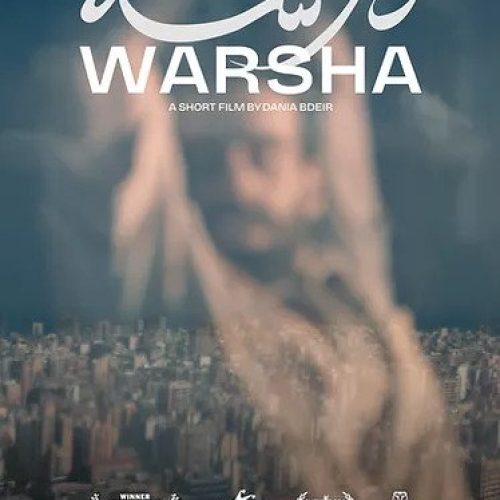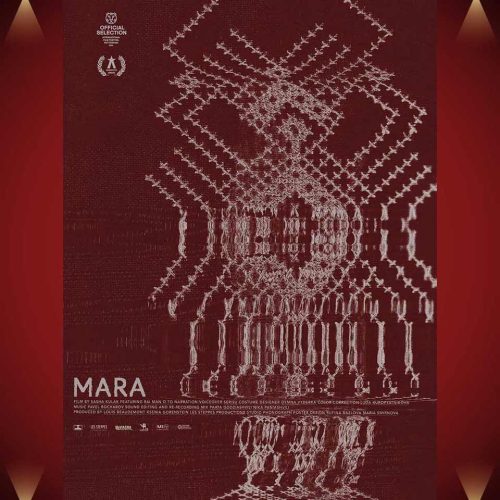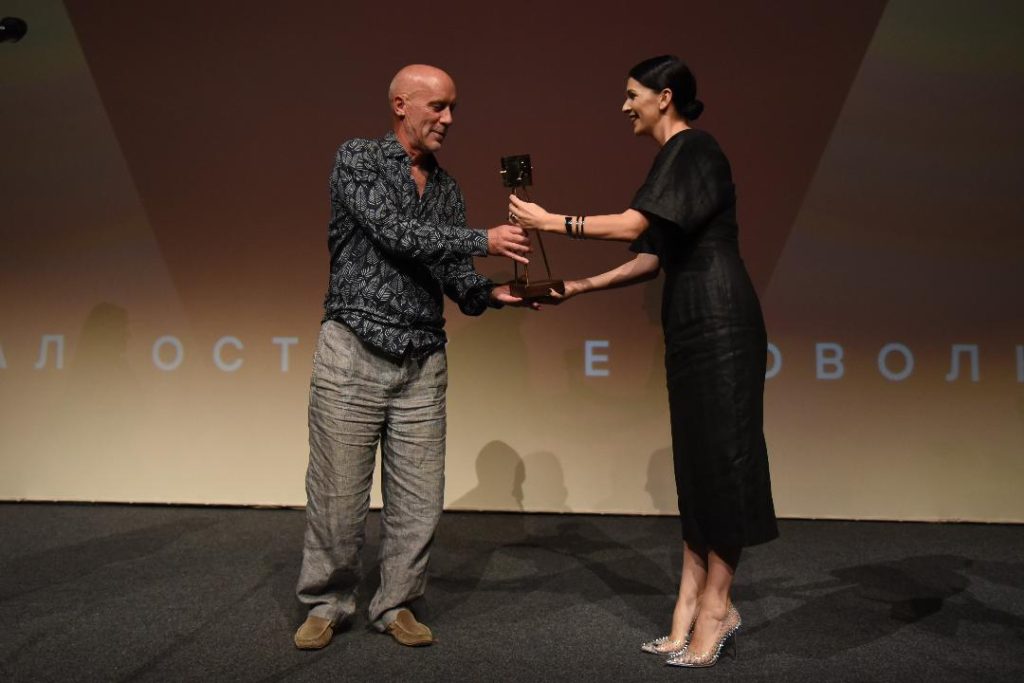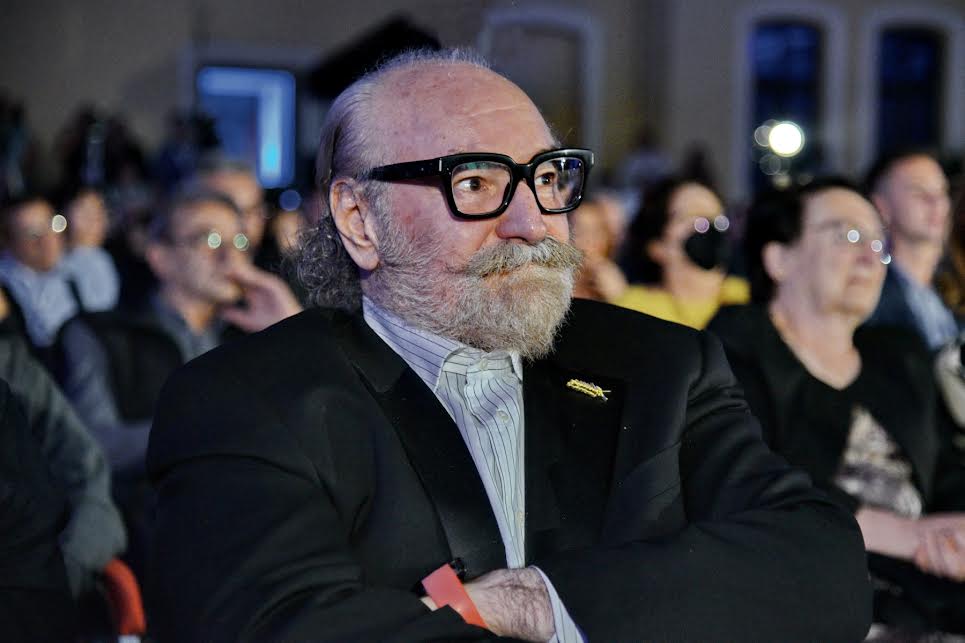2022 AWARD WINNERS AND LAUREATES
COMPETITION WINNERS OF THE 43. ICFF "MANAKI BROTHERS"

Golden camera 300
The jury announced the winner of the Golden Camera 300:
“For composing a powerful and touching story, breathtakingly interweaving the landscapes of mountains and the loneliness of men in harmony with nature, superbly filmed in harsh conditions which mesmerized the audience, the jury awards the Golden Camera 300 award to the cinematographer Ruben Impens.”
“EIGHT MOUNTAINS”
Cinematographer: Ruben Impens
Director: Felix van Greningen, Charlotte Vandermeersch
Country: Italy
Duration: 2 hours 27 minutes

Silver camera 300
The jury announced the recipient of the Silver Camera 300 award:
„For the wonderfully nuanced and picturesque portrait of life in Napoli and the precise and consistent framing in this beautiful love letter to Fellini with autobiographical overtones, the “Silver Camera 300” goes to Daria D’Antonio for the movie The Hand of God“.
“THE HAND OF GOD“
CINEMATOGRAPHER: Daria D’Antonio
DIRECTOR: Paolo Sorrentino
COUNTRY: Italy
DURATION: 2 hours 10 minutes

Bronze camera 300
The jury announced the winner of the Bronze Camera 300 award:
„For the subtle and solid cinematography poetically conveying touching human stories of tenderness which resonate universally, the “Bronze Camera 300” goes to Hidetoshi Shinomiya – “Drive my Car”.
„DRIVE MY CAR“
CINEMATOGRAPHER: Hidetoshi Shinomiya
DIRECTOR: Riyusuke Hamaguchi
COUNTRY: Japan
DURATION: 2 hours 59 min

Small camera 300
The jury announced the winner of the Small Camera 300 award:
„For perfectly crafting a great memorable visual poem combining traditional film language with new technology, thus reflecting the deeply suppressed feelings of the protagonist, The Small Camera 300 award goes to Shadi Chaaban for the short film “Warsha”.
„WARSHA“
Cinematographer: Shadi Chaban
Country: Lebanon
Duration: 15 min

Iron camera 300
The jury decided to present the Iron Camera 300 for Best Documentary to the film “Mara” by Sasha Kulak, which proposes an aesthetically and conceptually bold perspective to the politically turbulent times we are going through. It not only brings us to the headspace of the people who are exposed to political violence in different degrees but also offers cinematic approaches as tools for engagement with the political urgencies and lived experiences. It achieves this strong stance without aestheticizing the experienced violence nor alienating the audience.
Country: Belarus
Lenght: 61 min
Director: Sasha Kulak

Crystal camera 300
The jury announced the winner of the Crystal Camera 300:
„The award for Best Student Film goes to “Widow and Orphan”: for its deeply emotional portrayal of youth, estrangement and hope. A brilliantly shot film which tells the story in a unique way, not unlike the poetic cinema of Wenders and Malick. Told with a style, the film evolves through a multi layered narrative – as a visual stream of consciousness and in a liberating, experimental, fashion.”
Length: 14 min 33 sec
HONORARY AWARD WINNERS OF THE 43. ICFF "MANAKI BROTHERS
ANTHONY DOD MANTLE

JOHN MATHIESON

GORJAN TOZIJA

The 43 rd edition of the “Manaki Brothers” festival presents the GOLDEN CAMERA 300 for Lifetime Achievement to the exceptional British-Danish cinematographer: Anthony DOD MANTLE. With the choice to present the Golden Camera 300 for Lifetime Achievement to Dod Mantle, the “Manaki Brothers” Festival consistently builds up on the tradition of having previous laureates of the Special Golden Camera 300, which they have been presented with at an earlier stage of their professional lives, later be awarded with the Golden Camera 300 for Lifetime Achievement as well, thus completing a full circle in their creative trajectory. Therefore, 13 years after he became the recipient of the Special Golden Camera 300 for Outstanding Contribution to World Cinema Art in 2009, Dod Mantle is presented with the even more significant award, the one for lifetime achievement, which marks his entrance into the Club of Greats of the “Manaki Brothers” Festival.
In the meantime, his oeuvre has been enriched with a dozen of new films, as well as TV shows as his specialty (the most conspicuous one among them, both in subject matter and portrayal of the controversial Putin, being the 2017 “The Putin Interviews”, directed by the leading American director Oliver Stone).
Born in 1955 in Witney, in Oxford, Oxfordshire, in the United Kingdom, where he obtained his education up to secondary school graduation, Anthony Dod Mantle says that although he lives in Denmark, he wakes up every morning feeling very much like a British/English person. Yet, believe it or not, instead of proceeding with his university education at Oxford or Cambridge, he went on to study camera at the National Film School in Copenhagen, which is when he in fact started living and working in Denmark, soon becoming a naturalized Dane of British origin.
Immediately after his studies he started collaborating with several Danish filmmakers who would soon become the bearers of the New Wave in Danish Cinema, the most prominent part of this being his work on the Dogme genre, thus becoming one of the creators of this original Danish cinematic approach/movement, collaborating with the founders of the movement. Thus, in 1998 he filmed the first official Dogme film FESTEN/CELEBRATION that brought global acclaim to director Thomas Vinterberg, whereby Dod Mantle himself also drew a lot of attention with his cinematography, which is only natural since the essence of the Dogme expression and its asceticism is based on the manner in which Dogme film are shot (mainly by using handheld camera) where the image is created without any artificial sources of light, relying solely on natural light. 1999 was marked by the third Dogme film photographed by Dod Mantle, which is MIFUNE’S LAST SONG by director Søren Kragh-Jacobsen, a contemporary social drama about Kresten, a boy who leaves his family’s farm to move into metropolitan Copenhagen. That same year, the American independent author 20 years junior to Mantle – Harmony Korine sought out the collaboration with the experienced cinematographer with whom they shot the first American Dogme film – JULIEN DONKEY-BOY (featured in the Main Competition at the 21 st Manaki Brothers 2000, otherwise, the 6 th Dogme film).
For Anthony Dod Mantle, the collaboration between the main initiator and founder of the Dogme movement, Lars Von Trier was inevitable!, on two of the films from the thought-provoking USA trilogy: DOGVILLE (2003) and MANDERLAY (2005), and later on with the even more controversial ANTICHRIST (2009) premiering at Cannes, where Mantle demonstrated his superb mastery of cinematography by creating the visually shocking cinematic language and stream of consciousness narration envisioned by author Trier. Dod Mantle also collaborated with the leading Danish director Lone Scherfig on two films: THE BIRTHDAY TRIP (immediately after he graduated from film school in 1990), and later, on JUST LIKE HOME in 2007.
Mantle also worked on another film with director Thomas Vinterberg in 2003 as a cinematographer on his English-speaking drama IT’S ALL ABOUT LOVE, with the trio of American actors: Sean Penn, Joaquin Phoenix and Claire Danes. After gaining all these experiences Dod Mantle extended his work outside the scope of the Dogme films and went on to add several striking films to his portfolio, works of art bursting with strong visual energy and expressiveness, such as: 127 HOURS (2010, directed by Danny Boyle, with actor James Franco in the main role, playing an authentic alpinist who spent 127 stuck between the rocks, fighting to survive in the Utah canyons). In the film THE LAST KING OF SCOTLAND, he paints actor Forest Whitaker playing the notorious African dictator Idi Amin, and in his most recent work, in the film FIRST THEY KILLED MY FATHER (2017), with director Angelina Jolie they reconstruct the devastating authentic events from the drama filled life of a Cambodian freedom activist who survived the terrors of the deadly Khmer Rouge regime.
The biggest triumph in Anthony Dod Mantle career came in 2009 when he won one of the 8 Academy Awards for SLUMDOG MILLIONAIRE directed by Danny Boyle (which was screened at the opening ceremony at the 30 th anniversary edition of the “Manaki Brothers”). This film was also the crowning jewel in the tandem collaboration between Dod Mantle and Danny Boyle, with whom they had already previously made VACUUMING COMPLETELY NUDE IN PARADISE and STRUMPET (both made in 2001), followed by 28 DAYS LATER… (2002) and MILLIONS (2004).
John Mathieson is the latest representative of British cinematography to be presented with one of the two traditional awards this year – the Special Golden Camera 300 for Special Contribution to World Cinema Art, after the Golden Camera 300 for Lifetime Achievement was given to Anthony Dod Mantle. Mathieson is Dod Mantle’s younger colleague, whose name has been on our shortlist for quite some time already and now we felt the time was ripe for him to earn it. Born on the 3 rd May, 1961, in Purbeck, Dorset, England, UK, he belongs to the middle to senior generation of English cinematographers, with an enviable opus of over 65 credits, including short feature films, music videos, TV series, documentaries, all of these running as an additional lane in his experience to maturing towards the most delicate creative dimension – cinematography, the mastery of which he has demonstrated at the highest cine-aesthetic level through a number of long feature films as his oeuvre, and that he has been nominated and has won many awards for.
Mathieson caught our due attention about two decades ago with his masterpieces: THE GLADIATOR (2000, by director Ridley Scott) and the PHANTOM OF THE OPERA (2004 by Joel Schumacher, with 3 Academy Award nominations), that he was nominated for an Academy Award with, although he is in fact most deserving for some of the other Oscars that these films won. He earned The Gladiator its 5 Oscars: Russel Crowe’s for the Lead Role, the one for costume design, the one for sound design, best visual effects and the Best Film Award to producer Branko Lustig, who became the recipient of the Special Golden Camera 300 in 2007, exactly for his work on The Gladiator and the Spielberg Oscar-winning masterpiece – The Schindler’s List.
Mathieson was paid due respect by the BSC – the British Society of Cinematographers, whose member he is – that awarded him with the award for visual creation in The Phantom of the Opera. During this golden age for Mathieson, as festival programmer I selected several of his more intimist films for the Main Competition “Camera 300” – VIGO: A PASSION FOR LIFE (1998) and K-PAX (2001). VIGO is in homage to the eponymous classical anthological masterpiece of French Cinema – L’Atlante by director Jean Vigo from 1934, in which, as the title itself suggests, director Julien Temple and cinematographer Mathieson, put in the emphasis on the life and personality of Vigo as an auteur. In the other film by Mathieson selected for the “Manaki Brothers” Main Competition, K-PAX directed by Iain Softley, Mathieson follows the intimate drama of an elusive inmate in a psychiatric hospital who believes himself to be a visitor from the K-PAX planet, in one of Kevin Spacey’s most subtle artistic creations which is also matched by Jeff Bridges’s as the doctor treating him.
Mathieson proves to be up to their level of mastery in LOGAN (2017) by writer and director James Mangold featuring Hugh Jackman in the title role; from his most recent production DR. STRANGE IN THE MULTIVERSE OF MADNESS, with Benedict Cumberbatch as the title character where director Sam Raimi and Mathieson build a visual comic-book paraphrase of Spiderman. All of these spectacles, including the 5-fold Academy Award winner – The Gladiator, are characterised by huge budgets (starting at 200 million USD, and making a profit of almost a billion), shot/made with state of the art technology where visual effects are necessary and predominant.
Therefore, with this year’s Special Camera 300 for Outstanding Contribution to World Cinema Art, Mathieson crowns his genuine connection with the “Manaki Brothers” Festival, while we are overjoyed to have him as another laureate of ours from the ranks of British/global cinematographers.

